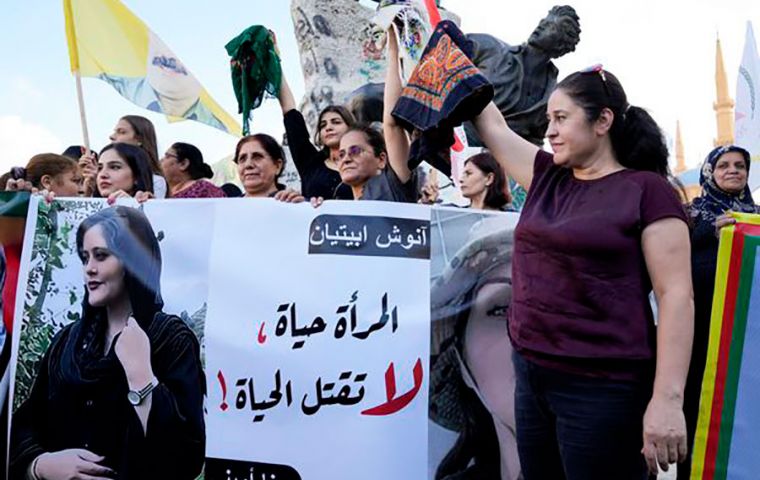MercoPress. South Atlantic News Agency
Fatalities of Iranian unrest reach 31
 Raisi would not speak to an unveiled woman
Raisi would not speak to an unveiled woman The number of people killed in riots all across Iran following the death of the Kurdish 22-year-old woman Mahsa Amini while in the custody of the morality police has been updated to 31, the Oslo-based Iran Human Rights (IHR) NGO said.
”The people of Iran have taken to the streets to achieve their fundamental rights and human dignity (...) and the government is responding to their peaceful protest with bullets,“ IHR Director Mahmood Amiry-Moghaddam said in a statement shortly after Iranian state television already mentioned 17 casualties including protesters and police.
Amjad Amini, Mahsa's father, said doctors refused to let him see his daughter after her death. Iranian authorities have claimed she died after suffering a ”heart attack“ and falling into a coma, but her family has said she had no pre-existing heart condition, according to Emtedad News, a pro-reform Iranian media outlet.
”Death to the dictator“ and ”Woman, life, freedom,” protesters could be heard shouting in video footage shared on the internet, during the biggest wave of protests to rock the country in nearly three years.
Security forces have fired pellets and bullets into the crowd, and also deployed tear gas and water cannons, according to Amnesty International and other human rights groups, after which Iranian authorities restricted Internet access and blocked messaging apps.
Some women burned their veils and symbolically cut their hair in defiance of the Iranian regime's severe rules.
Meanwhile, Iran's ultra-conservative President Ebrahim Raisi, who is in New York attending the 77th United Nations General Assembly (UNGA) and complained of a “double standard” from the West on the issue of hijab and other headscarves, stood up CNN host Christiane Amanpour after the TV reporter of Iranian descent refused to cover her face.
“This was to be President Raisi's first interview on U.S. soil during his visit to New York for the United Nations General Assembly,” Amanpour, 64, explained Thursday. “After weeks of planning and eight hours of setting up translation equipment, lights, and cameras, we were ready. But no sign of President Raisi,” she tweeted. “I think he doesn't want to be seen with a woman without a veil at a time when there are protests in his country,” she added. Amanpour explained that 40 minutes after the interview was due to begin, an aide to the president approached her and asked her to wear a headscarf.
“I politely declined,” she explained. “We are in New York, where there is no law or tradition regarding headscarves. I pointed out that no previous Iranian president has required this when I have interviewed them outside Iran,” she added.




Top Comments
Disclaimer & comment rulesCommenting for this story is now closed.
If you have a Facebook account, become a fan and comment on our Facebook Page!